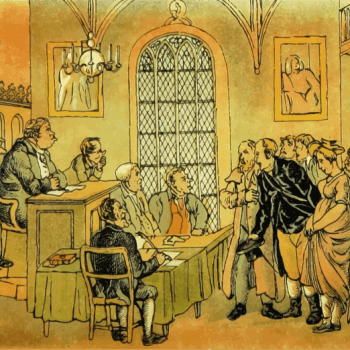
Some conservatives are trying to form a “parallel economy” as an alternative to that of the woke corporations, the internet platforms that will censor ideas they disapprove of, and the finance companies that will cancel your account if you transgress their norms.
Some Christians are grabbing onto the idea of a “parallel economy,” wanting to do business only with fellow Christians. This goes beyond the “buy Christian” ethos of the Christian Yellow Pages, focusing on the business side, urging companies run by Christians to develop Christian-run supply chains, vendors, and financial institutions, as well as hiring only Christians and marketing exclusively to Christians.
David Bahnsen, a leader in the work/faith movement (who has expressed appreciation for my books on vocation), has written a good response to those who think a parallel economy completely set apart from the regular economy is possible. From It’s Time to Think Honestly: Theological and Economic Error in the so-called “Parallel Economy” in World Magazine, which expresses some sympathy with the concept, but comes to this conclusion:
The interconnectedness of the modern economy is so engrained in our exchange of goods and services, it would take less than five minutes to enumerate a hundred ways in which “parallel economy” companies are going “unparallel” every minute of the day. We have every right to find companies that profess to share our belief system, but proclaiming that in so doing we are immunized from those who do not reflects an economic ignorance that is hard to imagine. Indeed, any rebuttal to this argument will be read on a computer made by a hardware company, across broadband lines provided by a company, on a phone made by a company, using an email system provided by a company, where the enterprise involved is deemed to be potentially hostile to the Christian way of life. If one tries to dismiss all of these categories, they surely could not dismiss the same reality about the furniture we sit in while reading it, the utility provider involved in the electricity, the maker of the paint on the laptop, the refreshments being consumed while reading it, etc.
Christians, he says, don’t need to do this: “Jesus encouraged His disciples in John 17:11–18 that we are not to be ‘of the world,’ even as we are ‘in the world.’ There exists a connectivity to the world on this side of glory that is inescapable, and devoid of ethical compromise.”
And he brings to bear the purpose of vocation, which is about loving and serving our neighbors. The neighbors for Christians in the business world are their customers. “In summary,” he writes, “our duty in producing goods and services is to bless our customers and do our work excellently.”
I would add, though, that from what I’ve read about the parallel economy movement (see here, here, and here), proponents are not necessarily advocating complete separation from the regular economy. Rather, they are mostly engaged in developing alternative products to those that have become associated with woke progressivism. To compete with chi-chi Starbucks, there is now the more macho Black Rifle Coffee. Bud Light, a brand now associated with transgenderism, is being answered with Ultra Right beer. To compete with censorious social media, alternative conservative-friendly internet platforms have been put together, like Rumble and Truth Social. Already Fox News is an alternative to the left-leaning news networks, and conservative and Christian websites abound. Why shouldn’t there be alternatives to PayPal and other digital services? Why shouldn’t conservatives organize meetings with investors to fund these sorts of businesses?
These ventures strike me as legitimate and in accord with free market principles, finding an unserved niche, recognizing a market, and trying to meet the need. But they do not constitute a parallel economy. Rather, they are part of the regular economy, as they should be. And maybe they will compete effectively with their left-leaning rivals, put them out of business, and replace them.
Illustration: Two Parallel Lines by Nova Division, CC BY-SA 3.0 <https://creativecommons.org/licenses/by-sa/3.0>, via Wikimedia Commons















